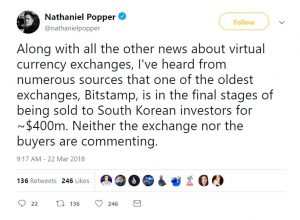According to a letter published by Bitstamp CEO and co-founder, Nejc Kodri?, to the Bitstamp website, the company has been acquired by NXMH, an investment company based in Brussels, Belgium. Bitstamp is a bitcoin exchange based in Luxembourg.
Merlak clarified that the Luxembourg-based company has been the subject of interest from a variety of suitors in recent times. He goes on to explain that the industry is at a point where consolidation makes sense. Furthermore, the quality of the offer and the quality of the buyer swayed the Bitstamp team in making the deal.
In the letter, Bitstamp customers are reassured that there will be no change of direction in terms of the focus and strategy of the company – that will remain unchanged. It reassured customers that the mission, leadership and vision of the company remains the same. Furthermore, it advised customers that they shouldn’t have any concerns about their accounts or changes to the way the company operates. Kodri? went on to say:
“I want to assure you that Bitstamp remains Bitstamp. We will continue to innovate with the goal of giving our customers the absolute best trading experience. It is business as usual here.”
Bitstamp maintain that the acquisition will strengthen the company, positioning it for growth and providing the opportunity to serve customers better. “The sale wasn’t planned. There was no active effort to go around and solicit buyers”, Kodri? told Reuters in an interview.
Kodri? did not disclose the terms of the deal – signed on October 25 – that was reached. Bitstamp is the largest cryptocurrency exchange by volume within the European Union, with turnover in the region of $100 million per day. The company was valued at $39 million in 2014, rising to $60 million by 2016.
Despite no official notification with regard to the price paid by NXHM, Nathaniel Popper of The New York Times had tweeted back in March about the impending sale of the company to South Korean buyers:

It would seem that negotiations on the sale have been ongoing for a considerable amount of time.
Belgium-based NXHM is a subsidiary of South Korean conglomerate, Nexon Holdings which is a giant in the world of online gaming whilst also being an investor in various digital technologies otherwise.
This is not their first foray into cryptocurrency. Nexon already own South Korean cryptocurrency exchange, Korbit, albeit that the businesses will be run independently. It’s NXHM subsidiary is the official buyer and acts as an investment vehicle for the conglomerate in Europe.
NXHM acquired an 80% stake in the company with Kodri? continuing to hold a 10% ownership interest and remaining in place as CEO. Venture Capital firm, Pantera Capital also sold part of it’s stake to NXHM, having invested $10 million in Bitstamp in 2014.
Bitstamp was founded in 2011 by Slovenian crypto enthusiasts, Damian Merlak and Nejc Kodri?. At the time, infamous crypto exchange, Mt. Gox dominated cryptocurrency exchange. Merlak recently explained that he felt they were doing a bad job, offering a poor user experience with a platform that was dull and suitable only for technically trained people. The two Slovenian entrepreneurs analyzed publicly available data and figured out that Mt. Gox were earning in the region of $10,000 per day on commissions. Merlak stated:
“We calculated that if we’re as bad as they [Mt. Gox] are, we can earn $10,000 a day.”
Mt. Gox was handling 70% of all crypto exchange by 2014 when it filed for bankruptcy following an exchange hack whilst Bitstamp went on from strength to strength to become one of the World’s leading exchanges.
The bear market in the cryptocurrency sector in 2018 has resulted in Bitstamp’s trading volume being 60-70% down on 2017. Notwithstanding that, the company remains profitable. It remains the worlds oldest actively trading cryptocurrency exchange, with 3 million registered users. Not a bad outcome for an exchange that was founded by Kodri? and Merlak in August 2011 in a Slovenian garage with a couple of laptops, a server and one thousand euros in start-up capital.
This article was written by Pat Rabbitte and originally appeared in The Bitcoinmag.











